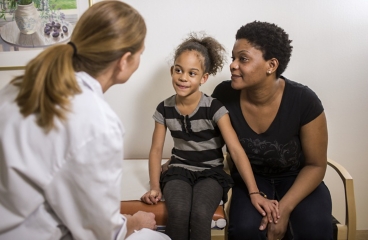Cardiac Catheterization to Repair a Heart Defect: Before Your Child's
Procedure
What is cardiac catheterization?

Cardiac catheterization can be done to fix some congenital heart
defects. This is a kind of heart problem that your child is born
with.
There are different kinds of heart defects. The heart may have a
hole between its chambers. Or a valve or artery may not have formed
the right way. In some cases, a heart valve, artery, or chamber may
not have formed at all. Any of these can affect how blood flows
through the heart or blood vessels.
Your doctor doesn't need to make any cuts to do this procedure.
Instead, the doctor uses a thin tube called a catheter. First, the
doctor puts the catheter into a blood vessel in the groin area,
neck, or other place on your child's body. Then the catheter is
moved through the blood vessel to the heart. Finally, the doctor
puts special tools through the catheter to fix the problem. Then the
catheter is removed from your child's body.
It can be scary when your child has a heart problem. It may help to
learn as much as you can about your child's condition. You may also
want to talk with other parents who have a child with a similar
problem.
How do you prepare for the procedure?
Procedures can be stressful for both your child and you. This
information will help you understand what you can expect. And it
will help you safely prepare for your child's procedure.
Preparing for the procedure
|
|
|
|
|
|
|
|
|
|
|
|
|
|
|
|

|
-
Tell the doctor ALL the medicines, vitamins, supplements,
and herbal remedies your child takes. Some may increase
the risk of problems during the procedure. Your doctor
will tell you if your child should stop taking any of them
before the procedure and how soon to do it.
|
The day before the procedure
What happens on the day of the procedure?
|

|
-
Follow the instructions exactly about when your child
should stop eating and drinking. If you don't, the
procedure may be canceled. If the doctor told you to have
your child take any medicines on the day of the procedure,
have your child take them with only a sip of water.
|
|
|
|
|
|
|
|
|
-
Be sure your child has something that's a reminder of
home. A special stuffed animal, toy, or blanket may be
comforting. For an older child, it might be a book or
music.
|
At the hospital or surgery center
|
|
|
|
|
|
|
|
|
|
|
-
After the procedure, your child will be taken to the
recovery room. As your child wakes up, the recovery room
staff will monitor your child's condition. The doctor will
talk to you about the procedure.
|
|
|
|
|
|
|
|
|
|
When should you call your doctor?
Current as of: June 24, 2023
Content Version: 14.0
Care instructions adapted under license by your healthcare
professional. If you have questions about a medical condition or
this instruction, always ask your healthcare professional.
Healthwise, Incorporated disclaims any warranty or liability for
your use of this information.